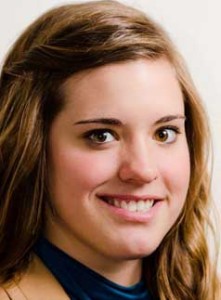Sept. 12, 2013
Column by Andrea Behling, Royal Purple EIC

Why do I write?
The answer to this four-word question is, well, hard to put down in writing. Joan Didion did it in a piece first published in 1976 with a confessedly stolen title from George Orwell, “Why I Write.” In about 2,600 words, Didion bares the bones of the writer holding the pen, which probably takes the same amount of courage as choosing to pursue a career in writing in the first place.
For me, in all of my amateur writing glory, I’ve been a moth to the flame for almost seven years. This is a bold statement for a 21 year old, I am acutely aware, but with every “ahah” moment I’ve been lucky to have in my journalistic career, my feelings have only been reinforced and my ambitions spurred.
My most recent moment of clarity came after reading the first person story of a journalist and two high school wrestlers who let her into their lives in 2009, and it ended up changing hers. It started as an ESPN feature so touching it almost required tears. But it is the follow-up story published this July that pulls on the strings of my heart in the most personal way.
Lisa Fenn had been working as an ESPN producer since 2003, dealing with sports-related human interest stories. One such story brought her to Cleveland, Ohio, to meet Dartanyon Crockett and Leroy Sutton. When Lisa first saw the two she said she couldn’t take her eyes off them. She watched Dartanyon, who was born with Leber’s disease leaving him legally blind, sling his friend’s arms over his back and pick him up off the ground. The reason he carried Leroy this way was because he is a double amputee, the result of having been run over by a train at 11 years old.
These physical limitations only scratch the surface of explaining the unfortunate hands these two were dealt. Bouts of homelessness and hunger plagued the friends’ young lives, constantly surrounded by drug use and poverty. Yet the two met their difficulties with a smile, together. Both members of the high school wrestling team, Dartanyon and Leroy were a package deal.
Lisa found herself emotionally invested in the story and lives of the two who were hesitant to lend out their trust to her in the beginning. But unable and unwilling to be another person to walk in and out of Dartanyon and Leroys’ lives once the story was told, Lisa never left. National attention was drawn to the story and an outpouring of support followed, which led to the creation of a college tuition fund. Lisa personally helped the two apply for college and paid for other necessities after high school.
The bond was real, and Lisa had made room in her heart for both of them. And in the process of telling their story to the world, Lisa changed the course of their lives for the better. Leroy went on to study video game design in college and will become the first in his family to receive a high school diploma and a college degree. Dartanyon received an offer to live at the Olympic Training Center in Colorado Springs to compete in the Paralympics, which he later won the bronze medal in judo. Both keep in close touch with the woman who cared, Lisa.
Usually you don’t hear this side of the story—the side that exposes the passion and emotion that goes into telling a meaningful story. A reporter is taught early on to be a shadow on the ground acting as an invisible narrator. But every journalist knows that these stories become a part of us in some way. It might just be a footnote, but sometimes it becomes a defining moment that changes everything.
This is why I write. I thank journalists like Lisa Fenn who remind me how powerful storytelling can be. It’s stories like this that help me see how incredibly rewarding this tough job can be, while also confirming how important it is in evoking change, big or small.
The stories I’ve told in my life are easy to recall, because I’ve placed them close to my heart. The stories of a child surviving a heart transplant, an artist finding himself, a man dedicating his precious free time to philanthropy—they are all still with me. Constant reminders of the courage it takes for a person to open up to a virtual stranger, and the fulfillment that comes with the privilege of putting it into words.

